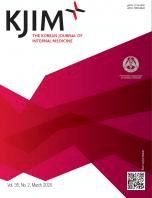
KOREAN JOURNAL OF INTERNAL MEDICINE
Scope & Guideline
Leading the Way in Internal Medicine Research and Practice
Introduction
Aims and Scopes
- Clinical Epidemiology and Public Health:
The journal publishes studies that investigate the epidemiological trends and public health implications of various diseases, focusing on the Korean population. - Chronic Diseases and Management:
Research on chronic diseases such as diabetes, heart disease, and kidney disease is a core focus, exploring management strategies, treatment efficacy, and long-term outcomes. - Infectious Diseases and Immunology:
Papers often address infectious disease challenges, including COVID-19, tuberculosis, and antibiotic resistance, highlighting clinical and therapeutic advancements. - Gastroenterology and Hepatology:
There is a strong emphasis on gastrointestinal disorders, liver diseases, and associated management strategies, reflecting the journal's commitment to digestive health. - Rheumatology and Autoimmunity:
The journal includes research on autoimmune diseases and rheumatic conditions, exploring pathophysiology, treatment options, and patient outcomes. - Cardiology and Vascular Medicine:
Cardiovascular health is a prominent theme, with studies examining risk factors, treatment modalities, and the impact of interventions on patient health. - Nephrology and Urology:
Research in this area focuses on kidney diseases, including chronic kidney disease and renal transplantation, addressing both clinical outcomes and novel therapies. - Oncology and Hematology:
The journal publishes findings related to cancer treatment, including chemotherapy efficacy, novel therapies, and management of hematologic malignancies. - Innovative Medical Technologies:
There is a growing interest in the use of artificial intelligence, telemedicine, and other technologies in improving clinical outcomes and diagnostic accuracy.
Trending and Emerging
- Impact of COVID-19 on Health Systems:
There is a significant increase in studies examining the effects of COVID-19 on healthcare delivery, patient outcomes, and the management of other diseases, reflecting the pandemic's lasting impact. - Health Inequalities and Socioeconomic Factors:
Emerging research focuses on the influence of socioeconomic status on health outcomes, particularly in the context of chronic diseases and access to care. - Artificial Intelligence in Medicine:
The integration of AI technologies in diagnostics and treatment planning is gaining traction, with studies exploring their effectiveness in improving clinical outcomes. - Microbiome Research:
An increasing number of studies investigate the role of the microbiome in various diseases, particularly gastrointestinal and metabolic disorders, highlighting its significance in health. - Multimorbidity and Geriatric Care:
Research addressing the complexity of multimorbidity in older adults is on the rise, focusing on integrated care approaches and the management of comorbid conditions. - Personalized Medicine:
There is a growing emphasis on personalized medicine, particularly in oncology and chronic disease management, reflecting advancements in genetic and biomarker research. - Telemedicine and Remote Monitoring:
The adoption of telemedicine and remote monitoring technologies is increasingly being studied, particularly in response to the COVID-19 pandemic and its implications for patient care. - Chronic Disease Prevention and Management:
Emerging themes emphasize preventive strategies and management approaches for chronic diseases, including lifestyle interventions and community health initiatives.
Declining or Waning
- Acute Respiratory Infections:
Research on acute respiratory infections, while still relevant, has seen a decrease as the focus shifts to chronic disease management and long-term health outcomes. - Pediatric Internal Medicine:
There appears to be a waning interest in pediatric internal medicine topics, possibly due to a shift towards adult-focused studies as the journal's primary audience. - Traditional Medicine and Herbal Remedies:
The publication of studies related to traditional and herbal medicine has declined, reflecting a trend towards evidence-based practices and pharmacological treatments. - Non-communicable Diseases in Young Adults:
Research specifically targeting non-communicable diseases in young adults has decreased, possibly overshadowed by a focus on older populations and chronic disease management. - Nutritional Interventions:
Although nutrition remains important, the specific focus on nutritional interventions as standalone studies has declined in favor of broader health and lifestyle management topics.
Similar Journals
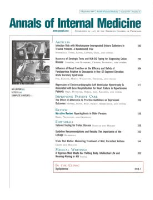
ANNALS OF INTERNAL MEDICINE
Empowering Healthcare through Rigorous ResearchANNALS OF INTERNAL MEDICINE, published by the American College of Physicians, stands as one of the leading journals in the field of internal medicine, with an impressive impact factor that underscores its significance in academic discourse. Since its inception in 1945, this esteemed journal has maintained a steadfast commitment to publishing high-quality research that spans a broad spectrum of internal medicine, making substantial contributions to clinical practice and health policy. With a current ranking of #5 out of 167 in the field of Internal Medicine and a remarkable 97th percentile ranking in literature, the ANNALS OF INTERNAL MEDICINE is recognized as a vital resource for researchers, healthcare professionals, and students alike. Although it operates under a traditional subscription model, the journal continually emphasizes the importance of disseminating robust clinical trials, systematic reviews, and expert commentaries that advance medical knowledge and practice. Its quartile rankings in Q1 for both Internal Medicine and Miscellaneous Medicine highlight its role in shaping the future of healthcare through rigorous and impactful scientific inquiry.

Nephrologie
Unlocking the potential of nephrology, one study at a time.Nephrologie, published by Springer Heidelberg, is a vital addition to the field of nephrology, providing a dedicated platform for the dissemination of cutting-edge research and clinical practices in kidney health. With its ISSN 2731-7463 and E-ISSN 2731-7471, this journal facilitates open access to a range of articles aimed at enhancing understanding and treatment of renal disorders. Located in Germany, Nephrologie is recognized for its commitment to advancing nephrological knowledge despite being currently categorized in the Q4 quartile and holding a Scopus rank of #80/81 within its field, indicating its emerging potential in the academic landscape. Operating from Tiergartenstraße 17, D-69121 Heidelberg, Germany, the journal encompasses a diverse scope that includes original research, review articles, and clinical studies, fostering a collaborative environment among researchers, healthcare professionals, and students. As it converges between 2022 and 2024, Nephrologie positions itself as a crucial resource for those committed to improving renal patient care and outcomes.

WIENER KLINISCHE WOCHENSCHRIFT
Your gateway to essential medical discoveries and advancements.WIENER KLINISCHE WOCHENSCHRIFT, published by SPRINGER WIEN, is a prestigious medical journal with a rich history dating back to 1946. With an ISSN of 0043-5325 and E-ISSN 1613-7671, it serves as a vital resource for researchers, healthcare professionals, and students engaged in the field of general medicine. The journal holds a commendable Q2 category ranking in Medicine (miscellaneous) and is positioned in the top 18% of its field according to Scopus, ranked #110 out of 636. Although it is not an open-access journal, it offers an essential platform for the dissemination of high-quality research, case studies, and clinical insights from Austria and beyond. The objectives of the journal include advancing medical knowledge, fostering collaborative research, and providing practitioners with the latest findings that inform clinical practice. This makes it an invaluable asset for anyone looking to stay at the forefront of medical research and development.

Asian Biomedicine
Exploring the Frontiers of Biomedical ScienceAsian Biomedicine, published by WALTER DE GRUYTER GMBH, serves as a crucial platform for disseminating pioneering research in the field of biomedical sciences. Established in 2008, this journal has carved its niche in the landscape of academic publishing, concentrating on a diverse array of topics within biochemistry, genetics, and molecular biology, as well as medicine. Though it currently holds a Q4 ranking in its category, it is dedicated to fostering academic discussions and advancing knowledge among researchers, professionals, and students alike. While the journal features a variety of access options, it is committed to ensuring that its content remains relevant and impactful, with an emphasis on the latest developments and research trends. The editorial board encourages submissions that address pressing biomedical issues, thus empowering contributors to engage meaningfully with the scientific community. With a broad international scope and a focus on quality, Asian Biomedicine is poised to play an increasingly important role in the advancement of biomedical research in Asia and beyond.

Journal of Inflammation Research
Exploring Innovations in Immunology and Allergy ResearchJournal of Inflammation Research, published by Dove Medical Press Ltd, is a premier open-access journal dedicated to advancing the field of immunology and allergy, with a particular focus on the biological mechanisms underlying inflammation. Since its inception in 2008, this journal has provided a vital platform for researchers to share their findings and foster collaboration within the global scientific community. With an impressive 2023 impact factor placing it in the Q2 category for both Immunology and Immunology and Allergy, the journal has consistently maintained its relevance and high academic standards, ranking #100 in Medicine (Immunology and Allergy) and #118 in Immunology (Immunology and Microbiology) according to Scopus metrics. The E-ISSN 1178-7031 allows for easy access to a plethora of pioneering research articles, reviews, and clinical studies that address contemporary issues in inflammation and immunity. As a leading resource for researchers, professionals, and students alike, Journal of Inflammation Research is committed to facilitating the dissemination of groundbreaking discoveries that contribute to improved therapeutic strategies and health outcomes.

VASCULAR MEDICINE
Transforming research into practice for superior vascular care.Vascular Medicine is a premier academic journal for researchers and practitioners in the field of cardiovascular health, published by SAGE Publications Ltd. With an ISSN of 1358-863X and E-ISSN 1477-0377, this esteemed journal has been at the forefront of publishing quality research since its inception in 1992, with convergence extending to 2024. Ranked in the Q2 category for both Cardiology and Cardiovascular Medicine as well as for miscellaneous Medicine in 2023, it is recognized for its significant contributions to advancing knowledge and clinical practice within these domains. Its Scopus ranking situates it at #91 out of 387 in the field, reflecting its high impact and the relevance of its published research, which is crucial for addressing the challenges in vascular health today. Although it is not an open-access journal, Vascular Medicine remains dedicated to disseminating vital findings that bridge the gap between research and clinical application, making it an essential resource for medical researchers, healthcare professionals, and students alike.
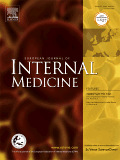
European Journal of Internal Medicine
Empowering Healthcare Through Peer-Reviewed DiscoveriesThe European Journal of Internal Medicine is a leading academic publication dedicated to advancing the field of internal medicine, published by ELSEVIER from the Netherlands. With an impressive impact factor and a Q1 ranking in the Internal Medicine category, this journal stands out as a vital resource for researchers, healthcare professionals, and students alike. Spanning over three decades of converged publications from 1989 to 2024, it features high-quality peer-reviewed articles that cover a wide array of topics pertinent to clinical practice and medical research. Recognized for its contribution to the field, it occupies the notable 22nd position among 167 in Scopus rankings, reflecting its influential role in shaping contemporary medical discourse. The European Journal of Internal Medicine is not only a hub for innovative findings but also serves as a platform for interdisciplinary collaboration, offering valuable insights that foster advancements in patient care and treatment methodologies.
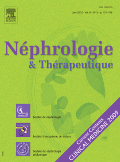
Nephrologie & Therapeutique
Fostering dialogue for a healthier future in nephrology.Nephrologie & Therapeutique is a distinguished peer-reviewed journal published by JOHN LIBBEY EUROTEXT LTD, dedicated to the field of nephrology. Since its inception in 2005, this journal has been pivotal in disseminating high-quality research in the areas of kidney disease, renal therapies, and nephrological advancements, and it continues to serve as an essential resource for professionals, researchers, and students alike. With an ISSN of 1769-7255 and an E-ISSN of 1872-9177, the journal is indexed in Scopus and is currently ranked in the third quartile (Q3) within the nephrology category, showing significant contributions to the discipline, despite its current ranking of 64 out of 81. Although Nephrologie & Therapeutique does not operate under an open access model, it nevertheless provides valuable insights and updates on the latest findings and practices in nephrology, making it an important platform for academic discourse in this field. The journal's commitment to advancing knowledge and fostering interdisciplinary dialogue underscores its role as a key player in shaping future research and clinical practices in nephrology.
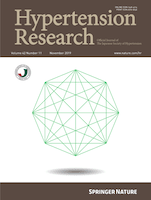
HYPERTENSION RESEARCH
Fostering knowledge exchange in cardiovascular medicine.HYPERTENSION RESEARCH, published by SpringerNature, serves as a premier platform in the field of Cardiology and Cardiovascular Medicine, Internal Medicine, and Physiology. Since its inception in 1992, the journal has built a substantial reputation, currently ranked in the second quartile (Q2) across several categories in 2023, reflecting its influence and high-quality contributions to medical research. With a focus on hypertension, the journal aims to disseminate vital research findings, clinical studies, and innovative treatment strategies to a diverse audience of researchers, healthcare professionals, and students, fostering knowledge exchange in the management of hypertensive conditions. Although it is not an Open Access journal, it offers comprehensive access to its extensive archive of valuable resources, ensuring that critical advancements in the understanding of hypertension are both accessible and impactful. HYPERTENSION RESEARCH is not only essential for those directly involved in cardiovascular and internal medicine practices but also for interdisciplinary scholars who are looking to explore the intersections of physiology and other biomedical fields in their work.

Immuno
Fostering Global Collaboration in Immune ResearchWelcome to Immuno, a pioneering open-access journal published by MDPI that serves as a key platform for the dissemination of innovative research in the fields of immunology, biochemistry, and genetics. Established in 2021, this journal has rapidly established itself within the academic community, currently ranking in the 53rd percentile in Medicine (miscellaneous) and 50th percentile in Biochemistry, Genetics, and Molecular Biology according to Scopus metrics. With a commitment to advancing our understanding of immune mechanisms and their applications in health and disease, Immuno is dedicated to publishing high-quality peer-reviewed articles that contribute valuable insights to both researchers and practitioners. Positioned in the heart of Switzerland, its global accessibility and diverse editorial board are a testament to its aim to promote knowledge exchange among scientists, practitioners, and students alike. Explore the latest discoveries and advancements in immunological research through Immuno, where your contributions help shape the future of this critical area of study.